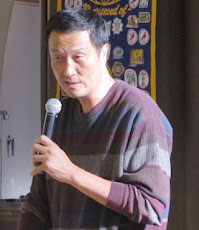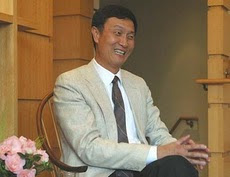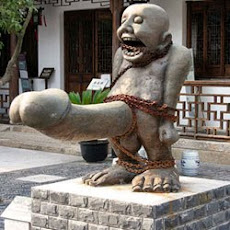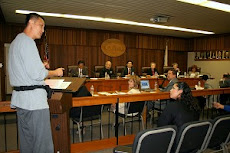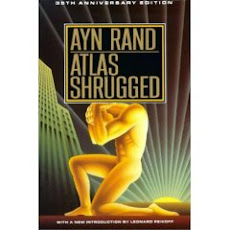Free People: Couple Leaves China after Hurdles of Olympic Proportions
陈凯夫妇 - 自由的人

Canyon Country has a lot of colorful characters, but it isn’t often we meet residents on a government blacklist.
Kai and Fiona Chen can never return to their home country – the People’s Republic of China.
Fiona is from the Shandong Province on the east coast of China, while Kai is from Beijing. Their stories are different, but their union has resulted in a doubly powerful voice against the hidden agenda of government in China.
Fiona left China on Christmas Eve in 2003 and moved to Canada with her firstborn son, Lawrence. Her father criticized the Communist Party while taking part in the Anti-Rightist Movement of the late 1950s, so her family members were being persecuted.
The magazine editor found a job working as a TV reporter in Vancouver, where she used her skills to spread a message to the rest of the world that the image of China coming through propaganda was untruthful. She worked to “expose the evil deeds of Chinese authorities,” who she had seen quashing dissidents and “committing crimes against their own citizens and people in the free world.”
“I shed tears over Tiananmen,” Fiona said. “Since 1949 more than 80 million people have been killed. I was shocked by that.”
Fiona’s father was a writer and publicist who had to use a fictional name because of his statements against the government.
“In China there’s a one child policy,” said the mother of three – Lawrence, 16, David, 10, and Celina, 6. “I didn’t want my kids to live in (Communist Chinese) society.”
“In China there’s a one child policy,” said the mother of three – Lawrence, 16, David, 10, and Celina, 6. “I didn’t want my kids to live in (Communist Chinese) society.”
Fiona didn’t know anyone when she moved to Vancouver. Her parents immigrated to Canada two years after she did, where they still live today.
“When I landed (in Canada) it felt totally different, how people naturally trust each other. There’s a genuine smile on their face. They share their story—not just to please people.”
Fiona met Kai in 2007 before the Beijing Olympic Games. She produced a four-episode documentary called “My Way” about Kai, a former Chinese professional basketball player, who she married in 2014.
“In one month there were more than 300,000 viewers,” Fiona said. “People were so moved by Kai’s story.”
She said the Chinese government soon blocked the YouTube upload of her documentary. “It was one professional athlete to stand up,” she said.
And when Kai Chen stands up, his 6-foot, 7-inch frame is noticed.
“Once the door opened in China, I was gone,” said Kai, a former professional basketball player for China’s National Team. He left China in 1981.
Born in Beijing, Kai’s family was caught up in the turmoil of 20th century China. They were involved with the Kuomintang, or KMT, the ruling party in China until 1949, when it moved to Taiwan after being defeated by the Communist Party. Kai’s father and his nine siblings were separated by the Taiwan Strait. His grandfather stayed in Beijing with Kai’s parents, while his grandmother went to Taiwan with his uncle and other members of his family. His grandparents would never see each other again.
Because of his family’s ties to Taiwan, Kai and his family were exiled from Beijing to Tonghua in Manchuria. During the Cultural Revolution, young people were sent to the countryside. They were forced to work at a grain depot, sometimes carrying up to 200 pounds on their shoulders. An avid basketball player, Kai found his passion through expressing himself on the court; later, it’s where he would find his freedom.
“The Communist Government wanted to use sports to break China’s isolation around the world,” Kai said.
Kai was chosen at the age of 16 to play for a National Athletics program grooming talent for the Chinese National Teams in 1970.
“Before I knew there was a country called America, America had already saved me,” Kai said. “Because America invented basketball.”
He first tried to free himself from the national authorities, who were going to send him back to the grain depot in Liuhe after Kai’s Taiwan relatives were revealed. Kai found he could get on a professional team in Guangzhou Military District, so he escaped from Beijing, pretending to go shopping, carrying just a yellow satchel to deter suspicion. It had Mao’s inscription, “Serve the People,” on it, which he said would make him “keenly aware of the immorality and corruption in this society. I would be reminded of the falsehood and lies spread by the authorities.”
Kai was caught and sent back to the grain depot. But he escaped again to a provincial basketball team, and finally joined the Chinese Army for the political benefit to his family. Due to the intense physical labor, repairing dams and military training, Kai developed bleeding ulcers and was on the verge of death. While hospitalized for a month, he made up his mind he would find happiness. He had never in his life known anyone in China that was happy, he said.
“The biggest revenge for me against this society was to find freedom and happiness for myself,” Kai said.
During the brief period following Mao’s death, Kai was able to obtain a student visa to the United States. He is a graduate of UCLA. Fiona’s family emigrated to Canada through the independent immigration process.
During the brief period following Mao’s death, Kai was able to obtain a student visa to the United States. He is a graduate of UCLA. Fiona’s family emigrated to Canada through the independent immigration process.
Both Kai and Fiona are on the “blacklist” in China.
Her writing and internet posting through her own company, Liberty Bell Studios, is aimed at introducing American values to those behind the Communist curtain. She forms online groups in order to penetrate fire walls created by the Chinese government to impede citizens of China from gaining access to that information. Kai and Fiona help others find software to break through those firewalls.
The couple described a group called “50 Cents,” which is a propaganda team hired by the Communist government. It is made up of young “opinion leaders” who earn 50 cents when they complete an internet post promoting Chinese Communism and government agendas.
“The (Chinese government) learned from the collapse of the Soviet Union,” Kai said. “They’re better than the Soviet Union at controlling your thoughts. It’s been pretty effective so far.”
They’re fanning nationalism and sentiment that is anti-U.S. and anti-Japan, according to the Chens.
Kai has spent decades protesting pro-Communism efforts and promoting the values espoused by America. A naturalized citizen of the United States, Kai fought Confucius Institutes that cropped up globally. It is a program teaching the language and culture of China that critics say advances the Chinese government’s agenda to falsely influence perceptions of China.
“I went to Congress and testified,” Kai said. “They terminated their contract because it violated U.S. educational policies, against American employment policies, when they hired teachers.”
There are hundreds in the United States at all levels of education. “These are brainwashing … propaganda about reality,” he said. “They do a lot to damage the U.S., weaken this country’s moral underpinnings.”
In 2009 Kai protested a restaurant in Hollywood called Mao’s Kitchen for their portrait of the former Chinese leader and for “singing Mao’s praises,” Kai said.
And when the Nixon Library had a statue of Mao Tse-Tung in his “world leaders” section near Winston Churchill, Kai organized a protest. “Mao is worse than Stalin and worse than Hitler, in terms of killing,” Kai said.
The Chens have strong political opinions, and share them when invited to speak at groups or meetings.
“Historians agree Mao committed atrocities against the Chinese people,” Kai said. “Reagan had great moral clarity, calling the Soviet Union an ‘evil empire.’ We needed an American president to enunciate moral principles.”
The Chens hope to affect U.S. policy toward their homeland. They hope to promote “political and moral wisdom in dealing with China.”
“We are not a country built on money; we are a country built on principles,” Kai said. “We feel obligated to give back. (The U.S. is) the greatest country in the world. Don’t take it for granted.”
Fiona recently became a member of Zonta International of SCV. She was sponsored by a member, Ronnie Erickson. “They are a group concerned about women’s lives. I fit in this category,” Fiona said. “A life with lots of layers.”
It was a big shift from Canada to living in the U.S. She said the education her children are receiving in the U.S. is more focused on reading and math. She was particularly pleased that her son, David, was chosen to write two books through the Sulphur Springs School District Young Authors program.
The Chens said their kids are “making tremendous progress.” Ten-year-old David enjoys activities such as a magic class offered in Newhall, and six-year-old Celina takes piano lessons and plays soccer. Lawrence, 16, is a student at Canyon High School.
Kai is a four-year resident of Canyon Country and has two grown children, who both played college basketball – one at Yale and one at Brandeis University. Fiona moved here with her children in 2014.
“People are very friendly and they are trustworthy,” Kai said of the Santa Clarita Valley. “It’s very quiet. There’s a wonderful sense of community.”





